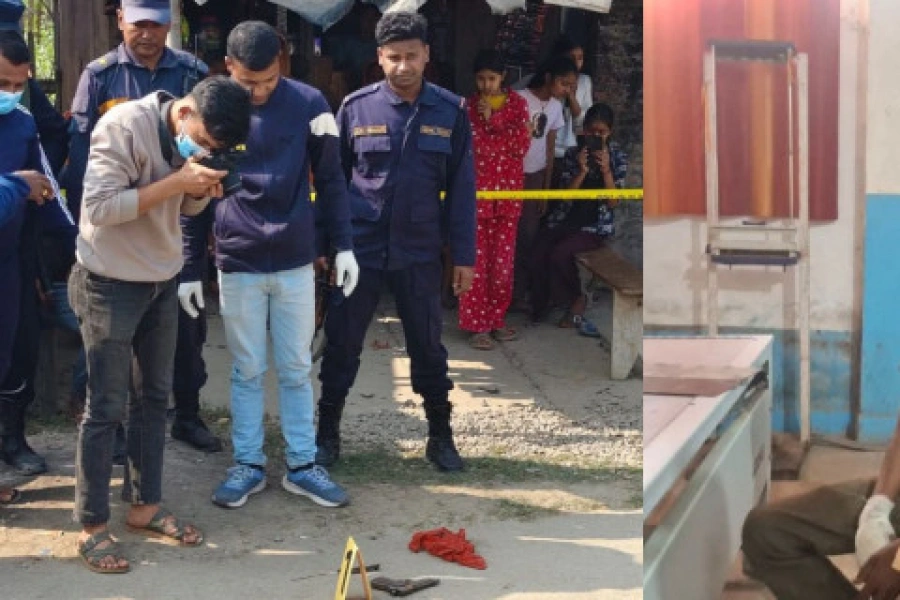PALPA, Nov 19: A coffee farmer from Burtung village of Palpa, Rewanta Bahadur Bista, 76, has a dream. He wants not just his own business to grow manifold, but also wishes that Palpa be identified as the best coffee production district. “And my dream is not baseless, we have all potential required to establish ourselves as best coffee producers in the country,” he claims.
Bista’s coffee farm is spread in five ropanis of land. He is also the district president of Coffee Entrepreneurs Association. “So far, our coffee has reached a few countries. But this can totally be different if we work a little more carefully,” he said.
According to Bista, even though farmers in Palpa grow the best quality of coffee, they have not been able to treat pests. If the government provide subsidy in coffee business or help them with technologies and equipments, there would be a dramatic rise in the number of people involved in coffee farming, he stressed.
“I am into coffee farming since many years now. And I feel that the biggest challenge is the controlling pests, and we have no easy remedy,” he said. “If we are little prepared, if we have resources, we can export huge amount of coffee,” he added.
Another issue for coffee farmer is hailstones. Last year, hailstone ruined his coffee produce massively. “Almost half of my coffee produce was destroyed by hailstorms. It was a disaster. It was not just my case. All the coffee farmers faced similar problem,” he reported.
29 tons of coffee exported from Gulmi, Palpa

Bista sold three quintal of coffee last year. The year before, he sold around six quintals of it and netted a profit of Rs 600,000. “For coffee farming you do not need special type of land. You can just use your backyard. It gives good profit as well, just you have to protect it from pests and hailstones,” he said.
Selling coffee is not a big deal for Bista. Traders from Kathmandu contact him. He gets call directly from foreign countries as well. “Our coffee is in demand. Businesspersons from Kathmandu deal directly with us. Similarly we get orders from abroad as well,” he said.
Bista is one among dozens of people in the district involved in coffee farming. In Maleng village alone, 47 households are into coffee farming. According to Basanta Karki, president of Maleng Coffee Production Cooperative, last year the cooperative sold off 25 quintal of coffee. The year before they sold 32 quintals. “Last year, the production was bit low. The volume of production was affected due to bad weather. We could not save coffee plants,” he said.
Also according to Karki, a little effort could change the scenario for coffee farmers in the district. So far people are doing coffee business at the individual level but if the government extends its support to them, they can take it to the next level, he said.
“There is no guarantee of farmers’ investments. And yet, they have been doing pretty good. Considering the high demand of our coffee nationally and internationally, we feel that the government must do something to boost the business,” he said.
There are many other cooperatives formed by coffee farmers. When they deal through cooperatives, it is easier to get market. According to Karki, farmers get worried when their coffee is attacked by pests. The government must provide them assistance and guarantee return on their investment if they are hit by harsh weather or other adversities.
“Farmers have learnt coffee farming on their own and have been doing their best to get better prices in the market. The government has not done anything to encourage them,” he said. He added that coffee from Palpa is sent in large quantity abroad.
According to Kamal Khanal, manager of Coffee Cooperative Association, Palpa, farmers are in need of coffee processing machines as well. In the lack of such machines, farmers are in loss, he noted. “We demand support from the government so that we can be independent in coffee production and processing. Not just independent, we can be an exporting nation,” he said. “But for that we need machineries and as well as skills development program,” he added.
Khanal also mentioned about last year’s hailstone and how it affected coffee farmers. “But the government did not express any concerns about our losses,” he lamented. According to coffee farmers, their coffee is in demand at the local, national and international level. But the lack of proper channel to market the production has limited their opportunities.
“Farmers here are quite eager to maximize their production. But due to several reasons they are not being able to do so,” he said. “Gulmi is already famous for coffee, now Palpa is on the way to gain that status. But we need government’s support to fully exploit our potential,” he added.
Normally, an average category of coffee of Palpa is sold for Rs 550 per kg. Depending on the quality, the price can go much higher.








































